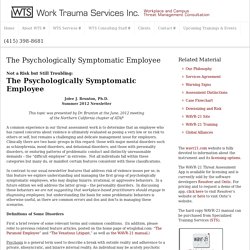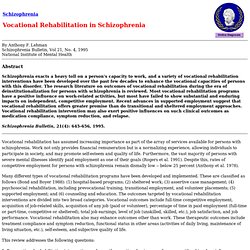

How Should DSM-V Criteria for Schizophrenia Include Cognitive Impairment? How Should DSM-V Criteria for Schizophrenia Include Cognitive Impairment? 2013 defdes. 2013_defdes.pdf. The Psychologically Symptomatic Employee. Jolee J.

Brunton, Ph.D. Summer 2012 Newsletter This topic was presented by Dr. Brunton at the June, 2012 meeting of the Northern California chapter of ATAP A common experience in our threat assessment work is to determine that an employee who has raised concerns about violence is ultimately evaluated as posing a very low or no risk to others or self, but remains a challenging and delicate management issue for employers. In contrast to our usual newsletter features that address risk of violence issues per se, in this feature we explore understanding and managing the first group of psychologically symptomatic employees, who may display bizarre, irrational, or aggressive behaviors.
Definitions of Some Disorders First a brief review of some relevant terms and common conditions. Psychosis is a general term used to describe a break with outside reality and adherence to a private, idiosyncratic, and bizarre internal reality. Case Management Strategies As this case illustrates: GetSharedSiteSession?rc=4&redirect= To view the full text, please login as a subscribed user or purchase a subscription.

Click here to view the full text on ScienceDirect. Figure Variance accounted for by genetic, shared environmental, and non-shared environmental effects for schizophrenia and bipolar disorder Red indicates genetic effects, with dark red for genetic effects in common with the other disorder and light red for unique genetic effects. Blue indicates environmental effects, with dark blue for shared environmental effects and light blue for non-shared environmental effects. Schizophrenia Simulation - Symptoms, Voices. Illustrated By Austin Watts.

For most of us, mental illnesses are concepts we can comprehend in the abstract — but actually empathizing with someone who suffers from one on a daily basis is another story entirely. There are often no physical symptoms for conditions like bipolar disorder, schizophrenia, and depression. And, because there's still a stigma in this country that prevents us from talking openly about these disorders (and few accurate representations of them in the media), it's difficult to understand how they work in reality. With that in mind, Anderson Cooper took part in an experiment designed to replicate the experience of someone suffering with schizophrenia. Cooper spent a day with a simulation of typical schizophrenia symptoms (i.e. voices) playing constantly in his ear; he was asked to perform simple tasks and go about his day. To see the TED Talk and try the simulator for yourself, click through to the next page.
Schizophrenia News from Medical News Today - Page 1. Boeing Inc on Schizophrenia. Schizophrenia is a chronic, debilitating brain disease that affects how a person thinks, feels and behaves.

About 1 percent of Americans have schizophrenia. Although the cause of schizophrenia remains unclear, treatment can relieve many of the debilitating symptoms. Because schizophrenia tends to first appear in young adulthood, many people who suffer from the disease are new to the workforce. As a supervisor, you should be familiar with the signs and symptoms of schizophrenia and be prepared to support an employee suffering from this disabling condition.
Doing so is cost effective. Signs and symptoms Early signs of schizophrenia often appear as grossly abnormal behaviors. Deteriorating work performancechange in personalitychange in personal hygiene and appearancesocial withdrawalappearing emotionally distant or detached decreased motivation and interest in worktrouble concentratingstrange body positioning Approaching your employee “I’m concerned about you. Resources. Successful and Schizophrenic. Schizophrenia.com. The following are questions commonly posted on our discussion boards, along with answers and advice from responding members.

In many cases, member answers have been expanded on from other sources, and relevant links have been addedfor more information. These answers are meant only as a helpful guide and a resource for further information; each individual situation is unique and may need a tailored solution. Your treating psychiatrist is always a good person to ask when you have specific questions pertaining to your own case. If you don't find what you're looking for here, please visit the Schizophrenia Main Discussion Board (see the righthand menu column on the Schizophrenia.com homepage ) and post your question. Our members are usually very generous with their advice and support. Index of Questions: Diagnosis and Treatment: How is schizophrenia diagnosed? How can I help my loved one get the best care possible? Neuroscience of Borderline, 2012. Vocational Rehabilitation in Schizophrenia. By Anthony F.

Lehman Schizophrenia Bulletin, Vol 21, No. 4, 1995 National Institute of Mental Health Abstract Schizophrenia exacts a heavy toll on a person's capacity to work, and a variety of vocational rehabilitation interventions have been developed over the past few decades to enhance the vocational capacities of persons with this disorder. The research literature on outcomes of vocational rehabilitation during the era of deinstitutionalization for persons with schizophrenia is reviewed. Most vocational rehabilitation programs have a positive influence on work-related activities, but most have failed to show substantial and enduring impacts on independent, competitive employment.
Schizophrenia Bulletin, 21(4): 645-656, 1995. Surprising Success Of Schizophrenics.